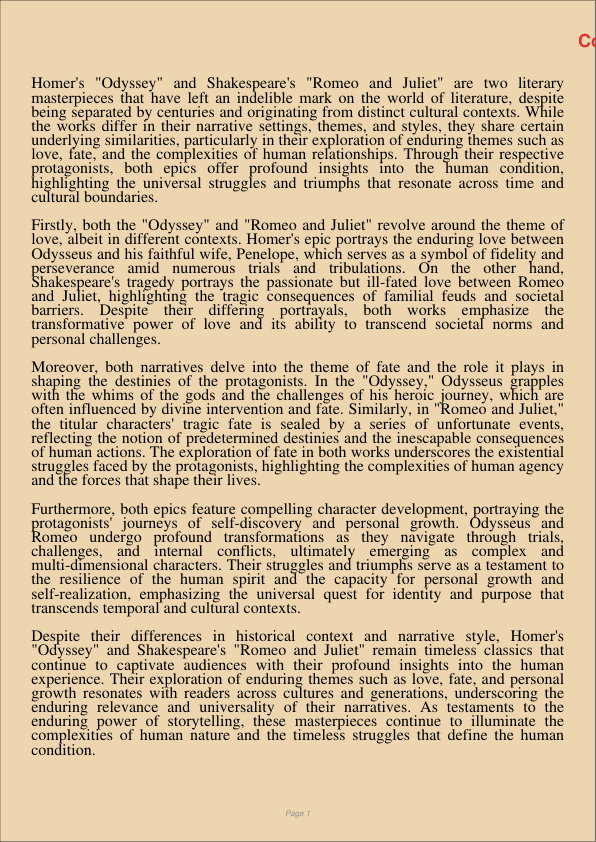Comparison Of HomerS Odyssey And ShakespeareS Romeo And Juliet
Jan 9, 2024
shakespeare
romeo
Biology
Marketing
Homer’s “Odyssey” and Shakespeare’s “Romeo and Juliet” are two literary masterpieces that have left an indelible mark on the world of literature, despite being separated by centuries and originating from distinct cultural contexts. While the works differ in their narrative settings, themes, and styles, they share certain underlying similarities, particularly in their exploration of enduring themes such as love, fate, and the complexities of human relationships. Through their respective protagonists, both epics offer profound insights into the human condition, highlighting the universal struggles and triumphs that resonate across time and cultural boundaries.
Firstly, both the “Odyssey” and “Romeo and Juliet” revolve around the theme of love, albeit in different contexts. Homer’s epic portrays the enduring love between Odysseus and his faithful wife, Penelope, which serves as a symbol of fidelity and perseverance amid numerous trials and tribulations. On the other hand, Shakespeare’s tragedy portrays the passionate but ill-fated love between Romeo and Juliet, highlighting the tragic consequences of familial feuds and societal barriers. Despite their differing portrayals, both works emphasize the transformative power of love and its ability to transcend societal norms and personal challenges.
Moreover, both narratives delve into the theme of fate and the role it plays in shaping the destinies of the protagonists. In the “Odyssey,” Odysseus grapples with the whims of the gods and the challenges of his heroic journey, which are often influenced by divine intervention and fate. Similarly, in “Romeo and Juliet,” the titular characters’ tragic fate is sealed by a series of unfortunate events, reflecting the notion of predetermined destinies and the inescapable consequences of human actions. The exploration of fate in both works underscores the existential struggles faced by the protagonists, highlighting the complexities of human agency and the forces that shape their lives.
Furthermore, both epics feature compelling character development, portraying the protagonists’ journeys of self-discovery and personal growth. Odysseus and Romeo undergo profound transformations as they navigate through trials, challenges, and internal conflicts, ultimately emerging as complex and multi-dimensional characters. Their struggles and triumphs serve as a testament to the resilience of the human spirit and the capacity for personal growth and self-realization, emphasizing the universal quest for identity and purpose that transcends temporal and cultural contexts.
Despite their differences in historical context and narrative style, Homer’s “Odyssey” and Shakespeare’s “Romeo and Juliet” remain timeless classics that continue to captivate audiences with their profound insights into the human experience. Their exploration of enduring themes such as love, fate, and personal growth resonates with readers across cultures and generations, underscoring the enduring relevance and universality of their narratives. As testaments to the enduring power of storytelling, these masterpieces continue to illuminate the complexities of human nature and the timeless struggles that define the human condition.
